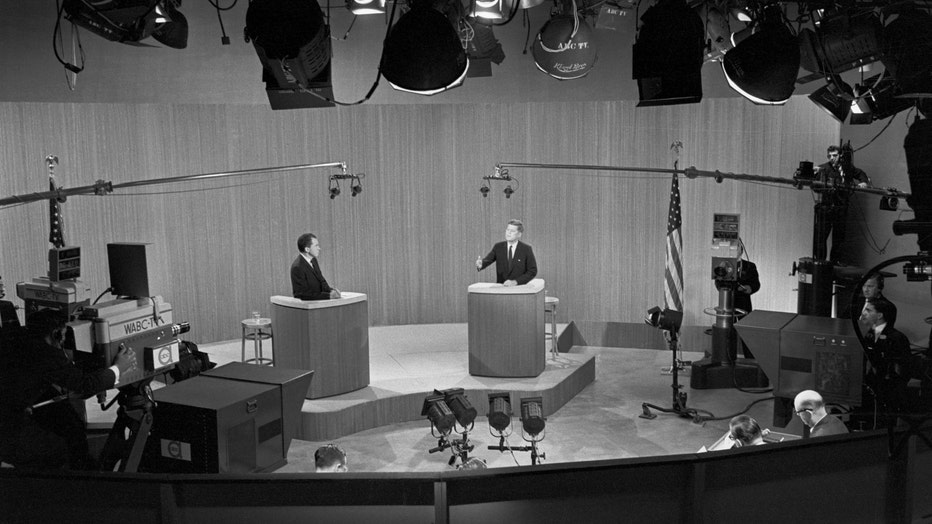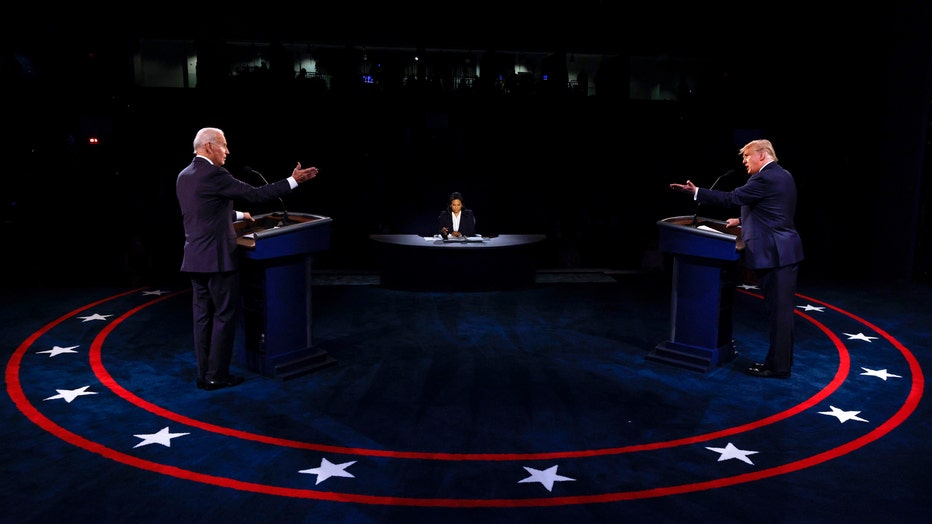Presidential debates: Here's what to know about the American political tradition
PHOENIX - President Joe Biden and former President Donald Trump are taking part in a presidential debate on Thursday night that is hosted by CNN.
Biden, the Democratic incumbent, gets the chance to reassure voters that, at 81, he’s capable of guiding the U.S. through a range of challenges. The 78-year-old Trump, meanwhile, could use the moment to try to move past his felony conviction in New York and convince an audience of tens of millions that he’s temperamentally suited to return to the Oval Office.
This is not the first time the two have debated each other, and presidential debates have a long history in the United States.
Here's what to know.
When did we start having presidential debates?
American presidential debates can be traced from a series of Illinois Senate race debates between Abraham Lincoln and Stephen Douglas in 1858, according to writers Josh Clark and Melanie Radzicki McManus of HowStuffWorks.
While public debate between presidential candidates happened in 1948 and 1956, the website for The Commission on Presidential Debates states that the first debates organized in a manner similar to what we are familiar with today happened in 1960. That year, four presidential debates took place.
As the Commission on Presidential Debates was only established in 1987, debates prior to 1988 were sponsored by different organizations. For example, the four debates in 1960 were sponsored by the three major broadcast television networks at the time: ABC, CBS, and NBC, while the League of Women Voters sponsored the debates in 1984.
How did the debate format change over the years?

Then-Vice President Richard Nixon and then-Senator John F. Kennedy engage in a televised debate during the lead-up to the 1960 presidential election. (Getty)
An article by Pew Research Center states that prior to 1992, candidates taking part in the debate only answered questions from a panel of journalists. By the 1980s, however, that arrangement led to criticism that it resembled a joint news conference more than an actual debate.
Starting in 1992, a "town hall" style debate was introduced, in which questions were asked by undecided voters. That same year also saw a vice presidential debate where a single moderator posed questions to the candidates taking part.
"Based on public feedback afterward, the commission decided to use only the single-moderator and town hall formats going forward," read a portion of the article.
Other changes involved the use of different communication mediums to show the debate: the debate in 1948 happened via radio. In recent years, the internet has also played a role in the debates.
Have there been years with no debates?
CPD's website states that there were no presidential debates between 1960 and 1976. The presidents at the time, Lyndon B. Johnson and Richard Nixon, refused requests to debate.
What's different with 2024's debates?
The CPD will not be involved in 2024's debates.
While the group had planned a series of three presidential debates and a vice presidential debate, both President Biden and Former President Trump made a deal on May 15 instead to hold two campaign debates: one debate hosted by CNN on June 27 and one hosted by ABC on Sept. 10.
Both the Biden and Trump campaigns, according to the Associated Press, took particular issue with the dates the CPD had announced, arguing the debates should happen earlier, before voting begins.
How are candidates selected for the debates?

Then-President Donald Trump and former US Vice President Joe Biden participate in the final presidential debate at Belmont University in Nashville, Tennessee, on October 22, 2020. (Photo by JIM BOURG/POOL/AFP via Getty Images)
In 2020, the CPD released their nonpartisan criteria for candidate selection.
Under the criteria, the candidate must be constitutionally eligible for the presidency, have his or her name appear on enough state ballots to have "at least a mathematical chance of securing an Electoral College majority," and polling data from five national public opinion polling organizations selected by the CPD show at least 15% of support, on average.
For 2024, CNN announced criteria that are roughly similar to the ones CPD adopted for 2020. ABC has also adopted the same criteria for its Sept. 10 debate.
Are there debates that feature non-major party candidates?
A group that calls itself the Free & Equal Elections Foundation has so far organized two debates, with a third one coming in July.
The first debate, which happened on Jan. 18, involved four Democratic Party candidates. President Biden was not among those who attended.
The second debate, which happened on Feb. 29, involved Green Party candidates Jill Stein and Jasmine Sherman, Libertarian Party candidates Chase Oliver and Laws Mapstead, and Claudia De La Cruz with the Party for Socialism and Liberation.
The group has issued invites to seven candidates for a debate they scheduled for July 12, including President Biden and Former President Trump. Other candidates invited include independent Robert F. Kennedy Jr., Oliver, Stein, Randall Terry with the Constitution Party, and independent Dr. Cornel West.
As of June 27, the website states that Oliver, Dr. Stein and Terry have confirmed they will appear in the debate.
Do Americans watch the debates?
Pew Research states that while debate viewership, as a share of the total TV audience, has fallen over the decades, the debates themselves can still attract more people than other non-Super Bowl events.
For the 2020 election, data shows that more than 73 million people watched at least parts of the first Trump-Biden debate. That number does not include those who streamed the debates or watched them online.
What do people think about the debates?
Gallup Research Center figures from 1988 to 2016 show that in most cases, six-in-ten or more voters surveyed said the debates were very or somewhat helpful in deciding which candidate to vote for.
The Associated Press (AP) contributed to this report.

